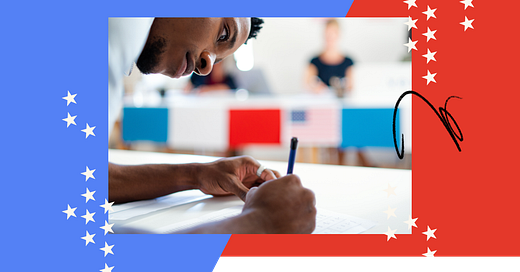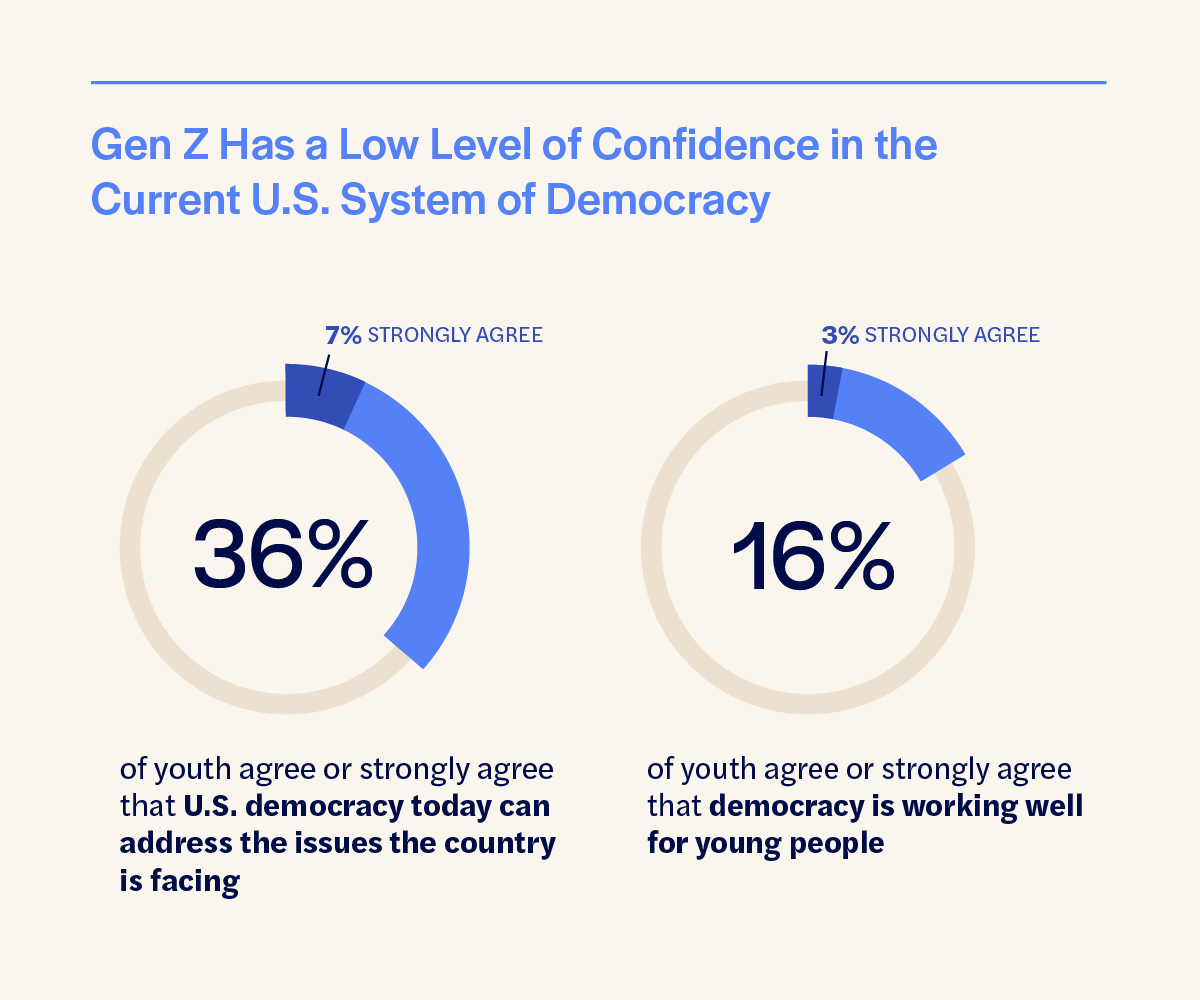How do young voters really feel about democracy?
It’s probably not what you think
We hear a lot of talk about young people, particularly Gen Z, and their support — or lack thereof — for democracy. On the surface, there’s a shade of truth to those concerns. Young people are disenchanted. But from their perspective, it’s not that they’ve entirely lost faith in democracy — it’s that they are being asked to believe in a future that feels fragile, or even irreparably broken.
New research from Protect Democracy and CIRCLE (the Center for Information & Research on Civic Learning and Engagement) challenges conventional wisdom about Gen Z’s relationship to democracy. While some young people are disengaged or disinterested, many are also navigating a system they believe in, in theory, but feel disconnected from in practice.
And while some remain hopeful and trusting (maybe to a fault), others are turning away, not because they don’t care, but because they’re simply not sure if democracy cares about them. As a member of Gen Z myself, I understand that disillusionment. But I also believe — deeply — that democracy still holds the power to deliver real, lasting change, and this research shows that I’m not alone.
What the research tells us
Our new white paper, How Does Gen Z Really Feel About Democracy? — built off polling conducted in November 2024 following the presidential election — finds that American young people can be categorized in three distinct groups, each with different relationships to democracy:
Passive Appreciation (63%) – These young people believe in democracy, trust institutions, and reject authoritarianism. But their satisfaction can lead to complacency — they often engage civically only by voting.
Dismissive Detachment (31%) – This group is skeptical of democratic principles and more open to authoritarian alternatives. Often left out of civic development opportunities, they lack trust in institutions and see little value in participation.
Hostile Dissatisfaction (7%) – Deeply civically engaged and equally disillusioned, these young people are the most politically active — and the most willing to consider extreme measures when change feels out of reach.
These profiles reveal that Gen Z’s attitudes toward democracy don’t map neatly onto common demographic lines like race, gender, or geography, echoing findings from previous research that caution against treating young people as a political monolith.
Despite these differences, most Gen Z respondents still believe in democracy at its core. What separates them is whether democracy in practice feels like something they can trust, something that delivers, or something that shuts them out.
But don’t just take my word for it — our research asked young people to put their feelings on our democratic system in their own words. Here’s what some young people told us when we asked them directly why democracy is or isn’t working for them:
“The government is primarily made up of people who are generations older and do not have a stake in the future. They keep kicking the can down the road — especially on things like the climate crisis.”
“How can I care about democracy when I can’t even afford to go to the doctor or pay off my student loans? The system wasn’t built for people like me.”
“Young people are changing the way things are done. We’re more vocal than ever — and that gives me hope we can shape the future.”
Each of these responses underscores the tension at the heart of this research: Young people still believe in the ideals of democracy — but many are losing faith in the systems meant to uphold them.
Young people are fighting back against authoritarianism. What can the pro-democracy movement learn from them?
Throughout history and around the world, young people often form the backbone of successful anti-authoritarian movements. Youth were critical in unseating a number of former authoritarian regimes, and they achieved this through leading movements, creating organizations, working to change institutions from the inside out, and setting aside differences to fight for something bigger.
In South Korea, student-led protests played a key role in the 2017 impeachment of President Park Geun-hye, after weeks of sustained public demonstrations demanding accountability. In Serbia, the youth movement Otpor! helped bring down the Milošević regime through mass mobilization, strategic nonviolence, and peer-to-peer organizing.
Fast forward to today, and our current pro-democracy movement has much to learn from the young researchers, activists, and civic engagement leaders working tirelessly to expand Gen Z’s participation in democracy.
Last week, we convened young leaders from across the country for a virtual event. You can watch the recording here: Voices of the Future.
Our speakers — from CIRCLE, MOVE Texas, BridgeUSA, and Protect Democracy — discussed the surprising reality on the ground: Gen Z isn’t checked out. They’re deeply invested in creating a democracy that works. But they need to be seen, trusted, and supported.
As my colleague Lara Hicks put it:
“Young people can opt out of the democratic process and lose faith in democratic institutions — even while believing in these core values and principles. It makes sense… if you don’t see yourself reflected in the process, democracy can feel like it’s not working for you.”
This disconnect doesn’t just explain frustration — it offers a roadmap. And it raises a challenge for every organization that claims to stand for democracy: How do we meet young people where they are — not just physically, but culturally and emotionally?
As Hailie Addison of BridgeUSA emphasized:
“We can’t rely on the traditional way of doing civic engagement — we have to acknowledge the cultural shifts Gen Z brings to the table. They want to feel ownership of the process, not just be asked to show up for it.”
This means investing in long-term, youth-led infrastructure — not just in election years, and not just to boost turnout, but to ensure democracy is worth engaging with.
So, are the kids alright? We will be.
Democratic (think process, not party) disillusionment among young people isn’t a fringe concern — it’s a bright flashing warning sign.
But, it’s also an opportunity.
Gen Z — my generation — has the civic skills, organizing power, and yes, the moral clarity to lead. What we need is a system that makes space for our voices, values our priorities and our futures, and equips us with the tools necessary to drive meaningful change in our lives and our communities.
When young people believe our participation matters, we don’t just vote — we change the world.








I truly appreciate all of their concerns, I feel those concerns are mine as well, our young people need a voice and we definitely need more young people holding public office of any kind, However I have attended 5 protests since the beginning of the year and 2 town halls and I can tell you, young people are absent from these events so it does make me wonder how concerned or interested they are in our country's future. I don't mean this to be a negative statement, just an observation.
Young people here never lived with a functional federal government where parties disagreed but worked together on important issues...the environment, civil rights, infrastructure. Since Newt Gingrich and the Tea Party, Republicans have been intractably obstructive with the stated goal to destroy bi-partisanship and democracy. No wonder young people are confused about democracy's value.